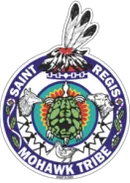Regulatory
Since early civilization many cultures, including the Mohawks, learned to live in harmony with wetlands. The wetlands along the banks of the rivers, islands and within the inlets have always been a critical component of the Mohawks. Throughout our cultural history, the wetlands have taught us the balance of nature, how to heal through the many medicinal plants, and to support fish and wildlife resources.
However, drainage and destruction of wetlands became accepted practices on the reservation as wetlands were replaced with agricultural fields and more recently by residential and commercial development. As wetlands have been lost or harmed, many species of cultural significance have become increasingly rare, threatened or extinct.
The federal Clean Water Act (PDF – 536 KB) gave Tribes the primary responsibility for implementing programs to protect and restore water quality. The St. Regis Mohawk Tribe took this one step further by developing and adopting two living documents: the Akwesasne Wetlands Conservation Act and the Wetlands Protection Plan. This comprehensive management system is based on a “no net loss/net gain” of wetlands for the Mohawk community.
